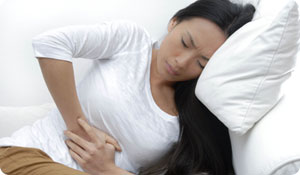
Gastroenteritis—or the stomach flu—is not influenza. It does not affect the stomach, but rather the small intestine. Gastroenteritis is an inflammation of the intestinal lining caused by a virus, bacteria, or parasites. Gastroenteritis spreads via contact with someone who has the illness, but it can also be spread through contaminated food, water, or hard surfaces.
Here are few of the bugs responsible for your tummy troubles.
Viral Gastroenteritis
Norovirus. Responsible for 21 million illnesses and 70,000 hospitalizations each year, it's usually transmitted through contaminated food. It is the most common cause of food poisoning in the U.S.
Rotavirus. This virus is the most common cause of gastroenteritis in children-especially those 3 to 15 months old. If an adult is infected with rotavirus, symptoms are usually milder.
Bacterial Gastroenteritis
E. Coli, Salmonella, Staphylococcus. The illness is usually caused when you consume food infected with the bacteria. Infection can occur from food processing, poor hygiene during food prep, and unsanitized surfaces. Additional bacterial culprits include campylobacter jejuni, shigella, and yersinia.
Symptoms of Gastroenteritis
Symptoms usually last one to three days, but can last longer.
- Diarrhea
- Abdominal pain
- Vomiting
- Headache
- Fever
- Chills
Complications of Gastroenteritis
If you do not drink enough fluid to replace what your body lost through diarrhea and vomiting, you may experience dehydration. It is more common for dehydration to occur in infants, young children, the elderly, and people with compromised immune systems.
Signs of dehydration include:
- Excessive thirst
- Dark-colored urine
- Infrequent urination
- Dizziness and faintness
- Dry skin
Treatment for Gastroenteritis
Fortunately, you can care for a bout of gastroenteritis at home.
Drink plenty of fluids. Water, fruit juice, sports drinks, clear broths, and soft drinks (think ginger ale) will help replace fluids and electrolytes.
Choose a light, bland diet. When ready to eat, start with bland, easy-to-digest foods. Good choices: White rice, toast, potatoes, cereal, applesauce, bananas. Avoid: sugar, dairy, caffeine, alcohol, and fatty foods.
Get plenty of rest. Most people recover with no treatment, but see your doctor if you:
- Are vomiting or have diarrhea for more than two days
- Have bloody diarrhea
- A fever of 101°F or higher
- Lightheadedness or fainting upon standing
- Confusion
- Have an increase in abdominal pain
Prevention of Gastroenteritis
The best way to protect yourself is to frequently wash your hands:
- Before preparing food or eating
- After using the bathroom
- After changing diapers
- Before (and after) caring for someone who is ill
Experts advise you lather well with soap and rub hands vigorously for at least 20 seconds. Be sure to wash the backs of your hands, your wrists, in between your fingers, and under your nails. Rinse well. (If in a public restroom, use a disposable towel to dry your hands and to turn off the faucet.)
Sources:
Viral Gastroenteritis. National Digestive Diseases Information Clearinghouse. Web. April 2012
http://digestive.niddk.nih.gov/ddiseases/pubs/viralgastroenteritis/index.aspx
Norovirus Overview. Centers for Disease Control and Prevention. Web. April 2012.
http://www.cdc.gov/norovirus/about/overview.html





